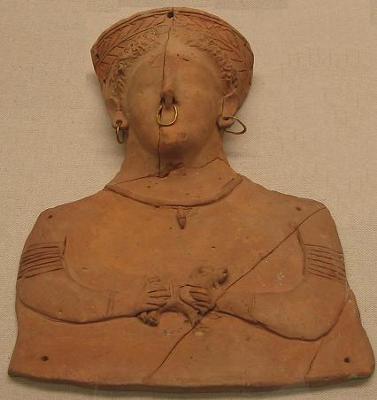Why do you say Leviticus 18:22 is about goddess worship?
by Grant
(Southeastern USA)
Because that's what experts and scholars say. Listen to James Neill and Dr. Robert Gagnon and conservative mega-church pastor John MacArthur. I don't agree with everything these men believe but in these brief quotations, they are spot on. Please be sure to click text links for additional information.
Quoting James Neill: "The condemnation of male homosexual acts in Leviticus is taken by many to be a straight forward prohibition, like the commandments of Moses. However, the origins and context of the provisions as well as the choice of words used make it clear that their original intent had more to do with... practices of foreign elements, chiefly the rituals of Baal and Asherah.
Leviticus 18, in fact, begins and ends with exhortations against following the practices of the Egyptians and the Canaanites, which implies that the prohibited practices listed in the chapter, which include the injunction against male homosexual acts, represent the forbidden customs of those neighboring peoples."
"Among the disapproved religious practices of the Israelites' neighbors, and a longstanding concern to the priests of Yahweh, was, of course, goddess worship...
Though modern Christians and Jews would read the passage in Leviticus 18:22, "For a man to lie with another man as with a woman is an abomination," as an injunction as clear-cut as "Thou shalt not kill," the Hebrew text has a very different slant. The word in the text translated as "abomination" in modern Christian and Jewish translations is to-ebah, which means "unclean," "ritually impure" or "idolatrous."
The expression had its origins in the Egyptian word for "holy" or "sacred," which the priests appropriated and then used in a negative sense when condemning rites or practices which were holy or sacred to non-Hebrews, practices which the priests of Yahweh regarded as idolatry.
The sense of the meaning is clear in its use in the phrase to-ebah ha goyem," "the uncleanness of the Gentiles." The term is used 116 times throughout the Old Testament, nearly always in reference to idolatry. For example, when the people of Judah are denounced in 1 Kings, Chapter 14 for idolatrous worship, to-ebah is used in verse 24 in reference to the homosexual rites of the kadesh, the male temple prostitutes associated with the goddess worship alluded to in the preceding verse 23...
Why the Aaronite authors of Leviticus would single out the act of a male taking the passive role in sex with another man can be explained by their centuries-long animosity towards the male temple prostitutes, the kadesh, who performed that sexual act as part the rituals of goddess worship.
The sense that the provision is directed against the male cult prostitutes is strengthened by the use of the Hebrew word zakar to refer to the male with whom the act is performed, rather than the word ish, the most commonly used term for a male."
Quoting John MacArthur: "Judah’s syncretistic worship was reflected in the practice of swearing by the Lord and, at the same time, by Milcom, who may be either the Ammonite deity of 1 Kings 11:5, 33 or Molech, the worship of whom included child sacrifice, astrology and temple prostitution (cf. Lev. 18:21; 2 Kin 17:16; Ezek 23:37; Amos 5:25, 26; Acts 7:40-43)."
The MacArthur Bible Commentary, 2005, Thomas Nelson Publishers, Nashville, p. 1038
Quoting James Neill:"While the term zakar can refer to a male, it is primarily used to refer to males with sacred associations, such as priests or men with special religious duties, or males dedicated to Yahweh in some sense...
When one considers 1) the cultic or sacral connotations of zakar, the male with whom the act is performed, 2) the fact that the prohibited act is a male taking a female role in intercourse, 3) the priesthood's historic animosity towards goddess worship and her homosexual attendants, and 4) the religious associations of to-ebah, and its use to condemn idolatry elsewhere in the scripture, it is hard to avoid the conclusion that the writers of the text had male sacred prostitutes specifically in mind in composing the verse (Lev 18:22)..."
Quoting Dr. Robert Gagnon: 1. "I do not doubt that the circles out of which Lev 18:22 was produced had in view homosexual cult prostitution, at least partly. Homosexual cult prostitution appears to have been the primary form in which homosexual intercourse was practiced in Israel.”Quoting James Neill: "Given the derivation of the term from an Egyptian term for sacred, its use elsewhere to condemn the religious practices of the Canaanites, the literal rendering of the words for the sex act in the text, and the cultic associations of the term used for the male with whom the act is performed, there can be little doubt that the provision was a product of the priesthood's long campaign to rid Hebrew worship of goddess worship and its sexual rituals...
2. The Hebrew term qedesim/qades denotes “men at cult sites who engaged in homosexual prostitution: male temple prostitutes.” p. 101.
3. Qedesim “...one of whose cultic functions was to offer their bodies to other men for same-sex intercourse.” p. 102.
4. “The remark in I Kgs 14:24 that the people of Judah “conformed their behavior to all the abominations (toebot) of the nations which Yahweh dispossessed” sounds remarkably like the summary in Lev 18:24-30, which followed a listing of sexual offenses that singled out in particular same-sex male intercourse as an “abomination.”” p. 103.
5. “The existence of homosexual shrine prostitutes in Judah was a recurring problem.” Dr. Robert Gagnon, p. 110.
Dr. Robert Gagnon, The Bible And Homosexual Practice, pp. 101-110, 130
There can be no doubt that the negative judgment of passive homosexual acts in Leviticus had its origins in their association in the minds of the priests of Yahweh with the homosexual rituals of goddess worship. The linkage with goddess worship cannot be avoided because of the choice of the religious term, to-ebah, in the text to relate the disapproval, and the language in the Hebrew text which specifies the prohibited act as a male taking the passive role in sex with a man.
The broadening of the condemnation to include all same-sex acts that occurred after the Jews were inundated with the detested homosexual traditions of the Greeks (in the first century A.D.) set the stage for the histrionic and visceral language that was commonly used in later periods against homosexuality."
NOTE: "The broadening..." is opinion presented as if it is fact when the reality is, it is NOT a biblical fact.
The Origins and Role of Same-Sex Relations in Human Societies, pp. 110-113, James Neill, McFarland, January 2009
Quoting Philo the Jewish philosopher, 20 BC - AD 40: “(40) And I imagine that the cause of this is that among many nations there are actually rewards given for intemperance and effeminacy. At all events one may see men-women (androgynes) continually strutting through the market place at midday, and leading the processions in festivals;In case you're wondering, Philo and first century Jews also believed Leviticus 18:22 and 20:13 prohibited temple prostitution.
and, impious men as they are, having received by lot the charge of the temple, and beginning the sacred and initiating rites, and concerned even in the holy mysteries of Ceres."
(Ceres is another name for Cybele, the fertility goddess first century Romans referred to as the Mater Deum or Mother of the gods). Remember, Philo lived and wrote this between 20 BC to AD 40.
"(41) And some of these persons have even carried their admiration of these delicate pleasures of youth so far that they have desired wholly to change their condition for that of women, and have castrated themselves and have clothed themselves in purple robes..."
(Philo describes castrated Galli priests who served Cybele in the first century).
"(42) But if there was a general indignation against those who venture to do such things, as was felt by our lawgiver..." (Moses was the Jewish Lawgiver. Philo refers to Moses' writings in Leviticus 18:22; 20:13 and Deuteronomy 23:17 and links those verses to the shrine prostitution he has just described.)
Return to 101 Community
Return to
Gay Christian 101 Home Page
Ashtoreth photo by
Pablo Alberto Salguero Quiles,
courtesy of Wikimedia Commons
Comments for Why do you say Leviticus 18:22 is about goddess worship?
|
||
|
||
|
||
|
||
|
||
|
||
|
||
|
||
|
||
|
||
|
||



